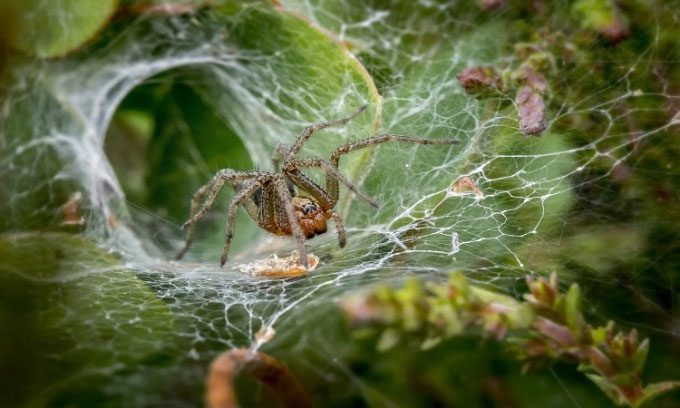The funnel-web spider exhibits a peculiar behavior during mating, lying still as if dead to reduce the risk of being eaten by the male after copulation.

The female funnel-web spider develops a play-dead behavior to deceive its mate. (Image: Pixabay).
Some species of funnel-web spiders, known for their characteristic funnel-shaped webs, are notorious for cannibalistic behavior, where females kill and consume males after mating. This makes mating significantly less appealing for male spiders, as they risk their lives for reproduction. To address this issue, several species have developed an unusual behavior referred to as play-dead behavior (symptoms of certain neurological disorders or diseases like Parkinson’s and epilepsy). The female spider will curl its legs and lie motionless as if dead, allowing the male to approach without the fear of becoming a meal, according to a study published at the end of March in the journal Current Zoology. This behavior enables females to better select suitable mates, as reported by Live Science on March 29.
Researchers were aware of play-dead behavior in spiders but were previously unclear if females voluntarily remained motionless for the benefit of males or whether males controlled this behavior. To clarify what occurs, the research team conducted experiments with the funnel-web spider species Aterigena aculeata, comparing play-dead behavior with similar behaviors to determine whether it was controlled by males or females.
In the experiment, the researchers observed female A. aculeata in three scenarios: natural play-dead behavior during mating, play-dead after being shaken in a test tube (thanatosis), and sleep induced by anesthesia. Afterward, the spiders were frozen to death. The researchers then crushed their remains to analyze the chemicals used to coordinate the spiders’ behavior. This process allowed them to investigate the chemical similarities between the behaviors.
If play-dead behavior resembles thanatosis, it may be controlled by females. However, if it is closer to anesthesia, it might be influenced by males, according to Mark Elgar, an evolutionary biologist at the University of Melbourne, Australia. The results show that play-dead behavior is almost identical to thanatosis. The research team concluded that play-dead behavior is controlled by females and plays a role in mate selection. If a female does not accept a male and plays dead, mating does not occur. Shortly after copulation, the male withdraws, and the female will then spring back to life and crawl away.


















































